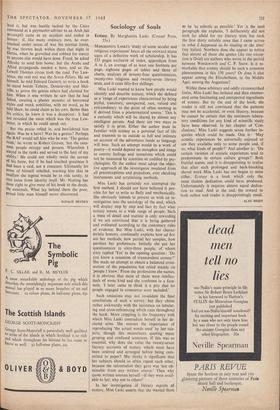situation clear he comes up, rather unexpectedly, with some excellent
comedy. The jealous painter's antics while he is spying on Cecilia (he is too besotted to understand that most houses have a back door), his frantic efforts to purchase her, lock and stock, with his mother's money, the final frenzy in which he urges her to marry him while covering her naked body with banknotes (on his mother's bed)—all this easily persuades one to forgive Signor Moravia the initial longueurs- and tautologies. I fear, however, that something more than mere comedy is intended; and indeed the blurb announces deep significance. In kindness to Signor Moravia, and in the interest of your own pleasure, ignore it.
Gwyn Griffin's fourth novel, Shipmaster, is an admirable sea yarn which ends in a holocaust, the latter, I suspect, having been devised for the author's purely private satisfaction. A disrepu- table liner is taking an assortment of working- class emigrants (both British and Italian) and upper-class escapists to Australia. Some of the ship's crew, in particular the Neapolitan chief officer, are quite nice, everyone else is bloody; rich and poor alike, they are a whining and embittered crowd of race-haters, shirkers and toadies, and the British are worst of all. But they are well observed and, like the nautical processes, well documented; so that I found myself believing in them as well as detesting them, and was delighted when a cyclone inspires the British passengers to an abortive mutiny (in protest at the chief officer's youth and nation- ality), then to panic and at last to their own self- destruction—which leaves the chief officer and a charm:ng cadet free to bring the ship safe home and become heroes.
It is all, however, a little too pat. True, some of the nice people are killed and one horrible little dog is not; but I cannot resist the impression that Mr. Griffin has spent 300-odd pages working up factitious hatred of his own characters simply in order to give himself the treat of playing the God of retribution, of drowning the unrighteous and rewarding the chosen. Mr. Griffin's private attitudes, in fact, are being allowed to become obtrusive. But they are no more so than his skill and energy as a writer; in any case this is a notable piece of narrative which I highly recommend.
Subtitled 'An Exegesis of Squalor,' Flann O'Brien's The Hard Life is a memorable essay in black comedy. Dublin at the turn of the century; rain, whiskey, priests, tattle and vice; cynicism, faith and, above all, dirt. Mr. O'Brien's almost callous economy of language, combined with an odd moral sensitivity, renders beastliness truly beastly but also conspicuously funny.
In The Men of Friday, Desmond Stewart produces some pukka Near-Eastern atmosphere and a promising Egyptian conspiracy (Farouk vintage); but while his situations are intriguing (and sometimes hilarious), his characters are not up to supporting them. Despite which, this novel is entirely readable. No Empty Hands suffers from a fatuous narrator (a non-writing writer) to whom no one in his senses would ever have confided anything but who, for the purpose of this fiction, is made father confessor to the whole cast. But once over this difficulty, and once one has discounted the blurb's injurious claim that this is a serious study of 'spiritual conflict' (it is in fact about a family made mildly eccentric by too much money), one can settle with great enjoyment to Peter de Polnay's story-telling, which is as flexible and persuasive as ever.
SIMON RAVEN
Open to Books
An Experiment in Criticism. By C. S. Lewis. (C.U.P., 15s.) REGULAR readers of C. S. Lewis will be familiar with the more irritating aspects of his literary persona; the avuncular chattiness, the arch references to books that everyone has heard of but only Professor Lewis has read, the implica- tion that not only is literature fun but that it should, ideally, be accompanied by the cracking of nuts and the imbibing of port wine, while the firelight flickers cosily upon the finely tooled backs of rows of well-loved volumes. This kind of thing is a nuisance, but it oughtn't to detract from the fact that Professor Lewis is one of the most intelligent and learned, if not one of the most invariably sensible. figures now operating in the Eng. Lit. field.
His new book is brief and polemical, though urbane; it is, in essentials, an all-out attack on the presuppositions and methods of the Leavisian critical establishment. The Doctor is nowhere mentioned, but his presence is everywhere felt; he seems even to have seized Professor Lewis's pen for one astonishing moment, in order to write






































 Previous page
Previous page